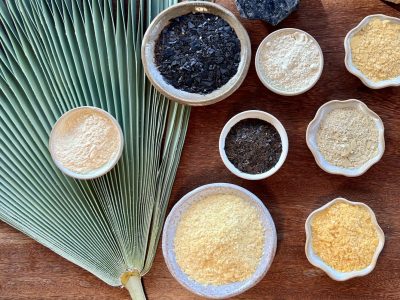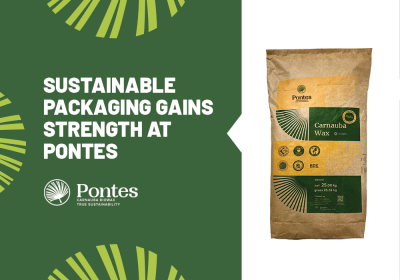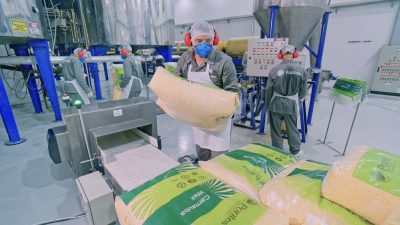Carnauba wax is extracted from the leaves of the carnauba, a tree native to Brazil. It is widely used in a variety of industries, including cosmetics, food, and automotive products, primarily as a coating agent due to its excellent protective and finishing properties. It is appreciated for its physical and chemical characteristics, which include a predominance of esters and stable, inert components.
Here are some applications of carnauba wax as a coating agent:
Carnauba wax in the food industry
Considered to be the hardest, with the highest melting point among vegetable waxes, it has become a favoured choice in the food industry. An important advantage of carnauba wax in the food industry is its effectiveness in preserving the post-harvest quality of fruit and vegetables. It presents itself as a natural and effective alternative to synthetic waxes, which are often derived from oil and can be harmful to both health and the environment.
Carnauba wax as a coating agent helps to reduce rapid water loss and accelerated post-harvest oxidation, which are responsible for deteriorating the firmness, crispness, and durability of products, resulting in weight loss and reduced shelf life. Other ways of using carnauba wax are as a glossing agent, acidity regulator, and thickener.
As well as being used directly as a coating, carnauba wax is also incorporated into composite films based on biopolymers, improving the barrier properties against humidity, gas and light. These films significantly increase the mechanical and thermal stability of foodstuffs, guaranteeing greater product durability and preservation. In addition, it contributes to the surface treatment of foods, offering various functionalities that are advantageous for food processes.
Carnauba wax offers additional benefits in protecting food from external contaminants such as dirt and microorganisms. Its ability to form a protective, impermeable layer helps preserve food, increasing its shelf life, without compromising its flavour or appearance. In addition, carnauba wax is hypoallergenic and non-toxic, making it a safe and efficient option for use in food products, meeting the requirements of international regulatory bodies that guarantee consumer safety.
The standards and regulations governing the use of carnauba wax in food products can vary in different parts of the world. In general, these regulations require the wax to meet strict purity and safety criteria for human consumption. Pontes’ certified carnauba wax meets all these requirements and complies with high quality and safety standards, being approved by international regulatory bodies such as the US FDA (Food and Drug Administration) and EFSA (European Food Safety Authority).
Carnauba wax in the cosmetics industry
Carnauba wax plays an important role in the cosmetic industry, particularly as a coating agent, due to its hardness, smooth texture, and ability to provide stability, gloss, and longevity to products. It is favored for its natural origin and versatility across a variety of cosmetic categories.
In lip products formulation, it is used to provide structure, smoothness, and a shiny finish. It helps the product maintain its shape and prevents it from melting too easily, especially in warmer conditions.
In mascara, it is included in formulations to improve the texture and longevity, providing a waterproof effect that helps the product adhere to lashes without smudging. Carnauba wax can also be found in eye shadow formulations to help the product stick better to the skin, providing a smoother application and a more long-lasting finish.
Carnauba wax in the automotive industry
Carnauba wax is a key ingredient in car waxes and polishes. Its ability to form a protective layer over the paintwork helps prevent environmental damage and enhances the color and finish of vehicles.
Carnauba wax in the furniture industry
Carnauba wax is also a valuable coating agent in the furniture industry, where it is used for its protective, aesthetic, and functional properties. Known for its durability, shine, and natural origin, carnauba wax has a long history of use in preserving and enhancing the appearance of wooden furniture.
It is creates a protective layer on the wood's surface helping to guard against moisture, dust, and dirt, preventing damage and helping to preserve the integrity of the wood. When applied to furniture, carnauba wax can add a layer of durability, helping to resist scratches and minor abrasions.
Carnauba wax in the building industry
Carnauba wax is valued for its ability to protect and enhance the appearance of various materials, including wood, concrete, stone, and even roofing materials. Its water-repellent, durable, and natural qualities make it an attractive option for creating protective coatings in both interior and exterior applications. It serves as a versatile and eco-friendly alternative in construction, particularly in areas that require a balance of performance and aesthetic appeal.
Carnauba wax as a sustainable alternative
From an environmental point of view, carnauba wax is a natural, renewable, and biodegradable ingredient. Its application represents a sustainable alternative to petroleum-based synthetic waxes, which have a negative impact on the environment. The use of carnauba wax contributes to reducing dependence on synthetic chemical products, promoting a more ecological and responsible approach to food preservation and packaging.
In conclusion, Pontes’ carnauba waxes are of great value to many industries, with a wide range of applications that help promote the preservation and quality of the products. Its versatility, safety, and environmental benefits make it an effective and sustainable solution. By adopting our carnauba wax, companies not only guarantee the quality of their products, but also contribute to promoting more responsible and conscious practices in the global market, reinforcing their commitment to sustainability and public health.





